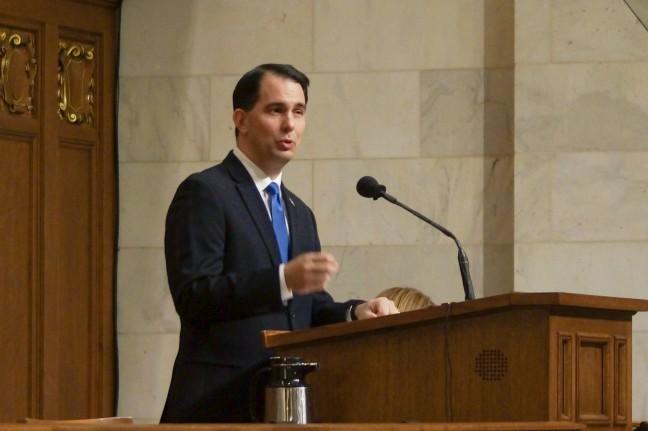Gov. Scott Walker traveled through Wisconsin Monday to tout the $4.7 billion in tax relief that he provided Wisconsinites since taking office. But some tax experts say the relief actually has negative effects.
In a statement Walker said his administration’s hard work has balanced the budget while lowering taxes for Wisconsinites.
“Today, we’re traveling throughout the state to highlight the over $4.7 billion we’ve put back into the hands of our hardworking taxpayers,” Walker said. “That is significant money they can then save away for a rainy day or reinvest back into Wisconsin’s economy.”
While taxpayers did save money, those tax cuts result in a loss of revenue for the state, Andrew Reschovsky, University of Wisconsin public affairs and applied economics professor, said.
Reschovsky said lower taxes result in less money for roads and a lack of funding for K-12 schools, which results in larger class sizes. Reschovsky also pointed to the $250 million cut the UW System took as a negative effect of taxpayer savings.
“It’s easy to say ‘I’ve cut your taxes,’ but that … translates dollar for dollar into a cut in services,” Reschovsky said.
$250 million cut to UW System remains as Assembly passes state budget
But Rep. Scott Allen, R-Waukesha, said the Legislature has to work hard to come to a consensus in order to pass a budget. He said some would advocate for even bigger spending cuts and even greater tax relief.
Allen said tax cuts help stimulate the economy because Wisconsinites put that money back into the economy.
“There’s a multiplier effect,” Allen said. “When people have available resources, generally they spend those resources, so they make purchases, hopefully of durable goods that get our economy moving. They invest in things that they wouldn’t otherwise invest in.”
When people have more money to buy goods and services, that also leads to job creation, Allen said.
Wisconsin Budget Project Director Jon Peacock, however, said the tax credits benefit the wealthy more than the poor.
One reason for this is because the wealthy pay a larger portion of the tax, and therefore receive larger cuts, Peacock said. But when all taxes are taken into account, those with high incomes actually have a smaller percentage of their income going toward taxes, Peacock said.
In 2014, taxpayers in the bottom 20 percent of earners spent 9.3 percent of their income on taxes, according to a study by the Wisconsin Budget Project. The top 4 percent of earners spent 7.8 percent of their income on taxes, and the top 1 percent spent 6.6 percent of their income.
This disparity occurs because sales taxes and property taxes take up a larger portion of the poor’s income, Peacock said. People with low-socioeconomic status still pay the same percentage in sales tax as those from the top 1 percent, which ends up being a heavier burden for the poor, Peacock said.
“[People with low incomes] may pay nearly as much sales tax as someone with five or 10 times the incomes,” Peacock said. “It’s a much higher percentage of their income.”
The wealthy are taxed at a higher percentage only for the federal and state income tax, Peacock said.
In addition to the poor contributing a higher percentage of their income to taxes, the Walker administration also reduced tax credits that provided relief to low-income families, Peacock said.
The Homestead tax credit no longer is adjusted annually for inflation, meaning that as incomes rise fewer people are eligible to receive the credit, Peacock said. Walker also reduced the earned income tax credit for families that have two or more children.
Reschovsky said the largest form of tax cuts that Walker initiated were in the form of cuts to the income tax. The second largest area for cuts came from a decrease in property taxes, Reschovsky said.
Wisconsin property taxes fourth highest in the nation, study finds
But the tax relief still has many benefits for Wisconsinites, according to Walker’s statement. A median-income family of four will save $916 over four years as a result of the largest income tax cut in 14 years.
Allen said Wisconsin’s economy is in much better shape now than it was before Walker took office. He said workforce participation rates have been growing.
Additionally, property taxes are currently the lowest they have been in Wisconsin since 1946, according to the statement. Businesses received a $17 million tax credit in 2016 and will receive a $22 million credit in 2017 to help boost job creation.
Walker said in the statement that his administration will continue providing tax relief to Wisconsinites in the future.
“Looking forward, we will continue to put our taxpayers first and work to reduce the tax burden Wisconsin,” Walker said.













